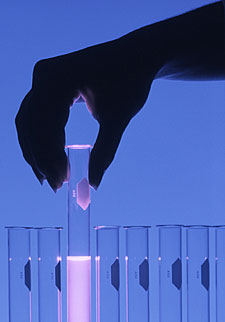A bill to be debated in New South Wales’ upper house from today could lead to an unintentional abuse of women if MPs vote to pass therapeutic cloning legislation.
An Anglican minister is sounding the alarm over what he believes is a common misunderstanding among parliamentarians regarding the availability of the human eggs used in stem cell research.
"The advice they have received is that the source of the majority of the eggs needed will be from women who are undergoing Assisted Reproductive Technology (ART) treatments such as IVF," says the Rev Michael Keith.
"From ‘real world’ experience this information is incorrect. There simply won’t be the source of eggs that is expected from ART," he warns.
 Mr Keith, a former Sydney Anglican now based in Wee Waa, has first-hand knowledge of the limitations of reproductive technologies.
Mr Keith, a former Sydney Anglican now based in Wee Waa, has first-hand knowledge of the limitations of reproductive technologies.
He has been contacting MPs alerting them to the probability that researchers will have to persuade women to undertake high-risk therapies to produce the “hundreds, even thousands of human eggs” required for therapeutic cloning.
"Most women who undergo IVF generally choose to fertilise all their eggs to achieve a successful pregnancy and those who don’t, do so for religious reasons," he points out.
"There simply will be very few eggs available for research."
Egg shortage could lead to unintended abuse
MPs Mr Keith has spoken to seem to believe eggs are available in abundance, but the assistant minister says many are actually mistakenly thinking of spare embryos " fertilised eggs.
He believes the shortage could place significant pressure on women, particularly those involved in ART, to produce more eggs for research.
"The demand for eggs from people undertaking this science is going to be enormous, especially with the hopes those keen to undertake therapeutic cloning are selling," he says.
MPs have pointed out there are safeguards in the bill to protect against the abuse of women and several hope that a steady supply will be obtained from altruistic donors.
But Mr Keith says "valuable considerations' for the production of eggs are a likely consequence of this bill being passed.
"If this bill proceeds, the great fear is that pressure, such as the introduction of discounted IVF treatments or priority service for donors, could lead to women taking increased dosage levels of drugs like Gonal-F or Puregon to create excessive amounts of eggs," he explains.
"This puts a woman's health at a much greater risk of early menopause and Ovarian Hyperstimulation Syndrome."
The NSW Senate will today set the timetable for considering the bill that has already passed the House of Representatives.





















